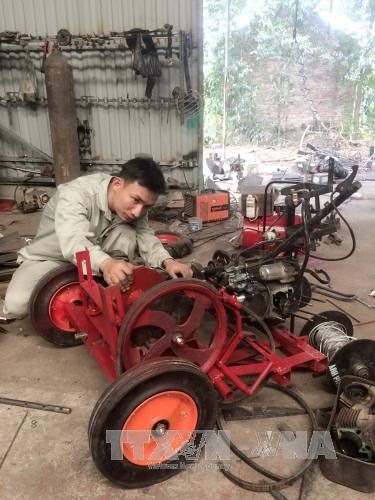
Ta Dinh Huy, 35, of Thuong Vuc Commune, Hanoi's Chương Mỹ District, was one of 86 outstanding young people given a 2017 Luong Dinh Cua Award, for making farming machines and creating jobs for 50 local youngsters.
 |
| Tạ Đình Huy works at his mechanic workshop. |
Ta Dinh Huy, 35, of Thuong Vuc Commune, Hanoi's Chương Mỹ District, was one of 86 outstanding young people given a 2017 Luong Dinh Cua Award, for making farming machines and creating jobs for 50 local youngsters.
The annual awards were presented on Thursday morning in Hà Nội.
Huy’s story began in 2005 when he graduated high school and opened a shop to repair motorbikes. Huy saw local farmers working very hard in their fields but without efficient agricultural machines.
He researched and made his first agricultural machine few months later. The machine was designed to cut soil, spray pesticide and irrigate.
The machine, worth about VNĐ1.6 million (US$70), was well received by local residents, the Tiền Phong (Vanguard) newspaper reported.
Huy later closed his shop and opened a mechanics workshop. He spent seven years upgrading the machine. In 2014, he unveiled the upgraded-version with eight functions, including ploughing, cutting soil, turning soil, burying soil, weeding grass, planting seeds, spraying pesticides and irrigation.
The machine cost about VNĐ13 million (US$750) but the productivity was much higher than a person doing the same work.
Now, the machine has 15 functions, including the ability to dig furrows and mix fertiliser. He has sold thousands of the machines across the country, with some even exported to Laos.
Huy was already honoured as one of 10 outstanding young people of Việt Nam in 2016.
Cao Đình Thuận, 18, of the commune said he quit studying after he finished 9th grade because his parents were very poor. He has worked at the workshop for two years and earns about VNĐ5 million (US$220) per month.
Rabbit co-operative
Another Lương Định Của Award winner this year is Nguyễn Mạnh Thắng, 31, of the northern Vĩnh Phúc Province’s Tam Đảo District. Thắng graduated from the Việt Nam National University of Agriculture, majoring in veterinary medicine.
After graduating, Thắng raised chickens but failed to make a profit. In 2014, he started raising rabbits. He bought 80 rabbits from New Zealand, but with little initial success, as many of the rabbits died.
Thắng said he had to visit other rabbit farms to learn. He found out how to clean the rabbits’ feeder and farm to ward off diseases.
Thanks to these lessons, the rabbits thrived and now females give birth seven to eight times a year, with litters of up to seven baby rabbits.
From the initial success, Thắng decided to invest VNĐ600 million ($26,400) to establish a farm to feed rabbits following Vietnamese Good Agriculture Practice (VietGAP) in 2015.
Now, his farm has 500 breeding rabbits and thousands of commercial rabbits each year. Thắng earns VNĐ300 million ($13,200) each year and employs eight local labourers.
Carpentry workshop
This year’s award was also given to Nguyễn Văn Thành, 31 of the northern Bắc Giang Province’s Yên Mỹ Commune. Thành was born in a family with a small carpentry workshop. Since he was child, he always wanted to broaden the workshop and create more sophisticated products.
He worked in a lot of workshops in nearby provinces to gain experience for several years. He improved his skills enough to open his own workshop in 2011 with investment of VNĐ100 million ($4,400). The workshop specialised in manufacturing wooden chairs, tables, beds, wardrobes, floors and stairs.
His business turned a profit quickly and three years later, he borrowed VNĐ200 million ($8,800) from a local bank to expand. He repaid the debt last year and opened three additional workshops. He earns revenue of VNĐ1.6 billion ($70,400) per year and employs 12 local workers.
The Lương Định Của Award is an annual award sponsored by the Hồ Chí Minh Communist Youth Union Central Committee, given to young people with outstanding achievements in manufacturing, trade, applying modern science technologies, protecting the environment and setting up new rural lifestyles.
(Source: VNS)





